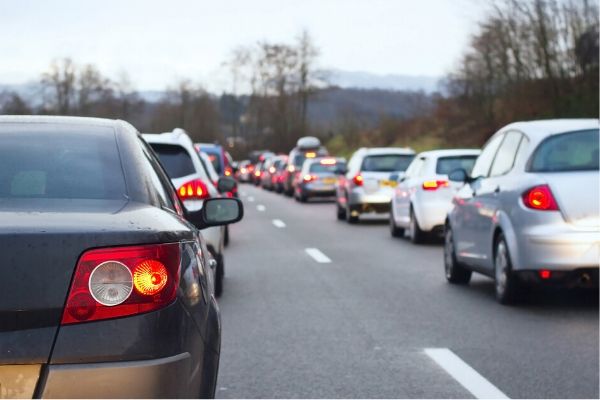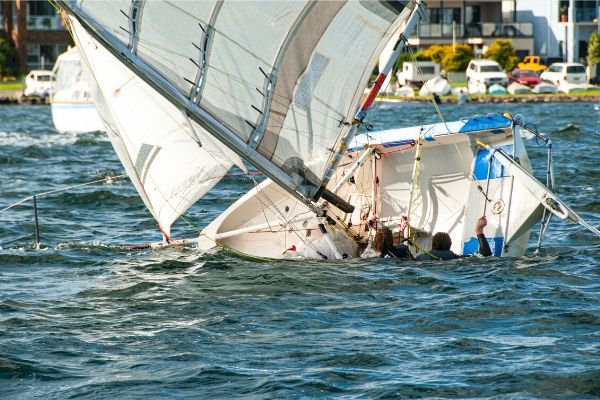Summer is a wonderful time of year. The weather is warm, school is out, and it’s the perfect opportunity to enjoy time with family. Unfortunately, preventable summer accidents are an issue across the U.S. According to the National Safety Council, fatal accidents spike in July and August. From car crashes to drowning, summertime accidents can be dangerous and even deadly. Our team at Huber Thomas & Marcelle compiled these important summer safety tips to keep you and your family safe, no matter where you’re headed this summer.
Avoid summertime accidents in the car
Resources from the National Highway Traffic Safety Administration consistently illustrate high fatalities during the summer months. In light of social distancing concerns, it’s possible that even more families will be opting for a road trip over air travel this year.
Keep these tips in mind before you hit the road to keep you and your family safe.
1. Don’t drive during high traffic times
 If you can, try to drive during times that are less busy. Mornings are generally quieter on the roads, except for Sunday, when people are returning home after the weekend.
If you can, try to drive during times that are less busy. Mornings are generally quieter on the roads, except for Sunday, when people are returning home after the weekend.
When it comes to a long holiday weekend (such as the 4th of July), consider taking a few extra days off to avoid the rush. According to AAA, one of the worst days for travel in multiple metropolitan areas is July 3, typically from 12-4 PM as people leave for their holiday destinations. Nationwide, delays may increase by up to 9% leading to more people on the road, all of them in a hurry to get out of town. That unfortunately means more car accidents.
Other high period times are July 4 afternoon, as people head out to local events, and July 5 when they return home.
2. Focus on the road
There are so many distractions when it comes to driving. Whether you’re trying to look at directions on your phone, driving after a night of little sleep in a new hotel, or listening to your children fight in the backseat, losing focus can be deadly.
Commit to focusing your attention on the road while you’re driving. If possible, have someone navigate for you or use turn-by-turn voice guidance. As always, never text or talk on the phone while driving.
Drowsy driving is just as dangerous. If you're not in shape to drive after a sleepless night, reconsider your plans or ask another driver to take the steering wheel.
3. Be vigilant about drunk driving
Between sun exposure and all-day events, fatigue and dangerously high levels of intoxication can come on fast. Be vigilant about avoiding and preventing drunk driving.
Whether it's you, a family member, or a friend, discuss who will be the designated driver before you leave for an event. This person should avoid all forms of alcohol as they'll have to be vigilant about other drivers on the road.
If everyone in your party wants to drink, book a taxi or rideshare option. Rideshare companies often have more drivers on the road during busy times, ready and available to bring you home. Book one ahead of time to beat the rush after an event or leave at an off-time.
4. Maintain your vehicle
Getting stuck on the side of the road after a breakdown is incredibly dangerous, especially on busy highways. Take your car in for service before you leave on a trip. Oil changes, battery checks, and tire rotations will ensure your car is in good condition.
Take this tip a step further by preparing an emergency kit to keep in your trunk. You should always have a cell phone charger, first aid kit, flashlight, and jumper cables. Throw in a few water bottles and nonperishable food items as well.
5. Never leave pets or children in the car
On average, 39 children under the age of 15 die each year from heatstroke after being left in a vehicle. Louisiana ranks high on the list of states where this is most prevalent. In many cases, it comes down to confusion over a disrupted routine. Unfortunately, family members often assume that someone else brought the child into the house after a car ride.
Check your car to make sure that everyone is out of the vehicle before going into the house. If you see a child unattended in someone else’s vehicle, call 911 and remove the child immediately.
Be aware of motorcycle dangers
With relaxed schedules and warm days, summer is a great time to go out on a motorcycle ride. Unfortunately, there is always an uptick in motorcyclist deaths during this time of year. Due to a variety of factors, motorcyclists are 27 times more likely to die in a motor vehicle crash than car passengers.
This is what you can do to protect yourself if you choose to spend the summertime on your bike.
6. Wear appropriate safety gear
Louisiana requires helmets for all motorcyclists and passengers. Look for a DOT sticker on the inside or outside of your helmet to ensure it meets these safety standards. These helmets provide appropriate shock-absorption and peripheral vision capabilities.
To protect yourself in the case of a motorcycle accident, you should also wear:
- Clothing that fully covers your arms and legs, in a thick material
- Boots or shoes that cover up to your ankles or higher
- Gloves for a better grip and to protect your hands
- Eye protection, such as a full helmet or goggles
- Reflective materials for better visibility on the road
7. Do a safety check before each ride
Before you hop on your bike, do a quick safety check. Is the weather conducive to riding? If possible, you should always avoid slippery conditions.
From there, check your tire pressure, brakes, headlights, and turn signals. Make sure all cargo is properly secured and balanced for a smooth ride.
8. Recognize the most common causes of crashes
RideApart offers an excellent resource, along with videos, that explains how to avoid and respond to the most common causes of motorcycle crashes. This knowledge can help you avoid summer accidents on your motorcycle. The most common accidents occur when:
- Another vehicle turns left in front of you
- You hit an unsafe or slippery patch of road
- Another vehicle changes lanes into you
- Someone opens a car door into your oncoming bike
- You were traveling too fast
- Another driver stops suddenly, or rear-ends you
- Anyone is driving under the influence of drugs or alcohol
This summer be aware of these risks and ready to respond if they occur.
9. Never drive under the influence
When it comes to intoxication, driving a motorcycle is no different than driving a car. Make it a rule to avoid driving if you've had even one drink.
Likewise, avoid driving after any use of prescription sedatives, pain medications, or other drugs. For example, while marijuana may be legal in some states, it can still lead to a change in your driving skills.
10. Practice active awareness during every ride
Riding a motorcycle is fun, but it's also more dangerous. It’s simply more difficult for other drivers in large vehicles to see you. With this in mind, practice being as actively aware as possible. This means:
- Proceeding cautiously at intersections, where most accidents take place
- Keeping your headlights on at all times to increase your visibility
- Leaving plenty of braking distance between yourself and other vehicles
- Using extra caution in heavy traffic or inclement weather
- Watching ahead for any potholes, gravel, or puddles
Stay accident free while boating
 Boating is a popular summer activity in Louisiana and other Gulf states. While it’s a great way to cool off and enjoy time on the water, boating can also be dangerous. In 2017, the U.S. Coast Guard reported 4,291 boating incidents that resulted in 658 deaths and 2,629 injuries.
Boating is a popular summer activity in Louisiana and other Gulf states. While it’s a great way to cool off and enjoy time on the water, boating can also be dangerous. In 2017, the U.S. Coast Guard reported 4,291 boating incidents that resulted in 658 deaths and 2,629 injuries.
Here are our tips for staying accident free while boating.
11. Always watch the weather
Keep an eye on the forecast before you head out for a day of boating. Summer is also hurricane season, which can be a serious concern when you’re on the water. Even a little rain can be incredibly dangerous. Reschedule if there's any change in the forecast.
Once you’re out on the water, be consistently aware of your surroundings. Storm clouds or a sudden temperature drop can result in high winds and risky conditions. If you find yourself in this situation, get off the water as soon as possible.
12. Take a boating safety course
Many people assume that operating a boat is similar to driving a car. How hard can it be? This couldn’t be further from the truth.
The U.S. Coast Guard recommends enrolling in a boating safety course before you get behind the throttle. These courses are offered for all types of recreational boaters. The most popular basic courses generally have six to 13 lessons that cover everything from boat handling to reading the weather.
Beyond these courses, boating laws can vary from state to state. Familiarize yourself with specific regulations based on where you’re traveling.
13. Wear a life jacket
While life jacket regulations vary from state to state, all boaters should opt to wear one, even good swimmers! It’s easy to become disoriented after falling off a boat, especially if you’ve been injured. A life jacket will help you avoid drowning in the case of a serious accident.
When it comes to children, life jackets should be mandatory at all times. Always use life jackets that are U.S. Coast Guard approved and fit correctly.
14. Avoid alcohol
Like driving a car, operating a boat while under the influence is illegal. You could face jail time, fines, and even have your driver’s license suspended.
In worst case scenarios, drinking while operating a boat can lead to accidents that result in serious or even fatal injuries. Alcohol use continues to be the leading known contributing factor in recreational boating deaths in the United States. Even one drink puts everyone at risk as the nature of boating magnifies the side effects of drinking.
If you’re in control of the boat, it’s best to simply stay hydrated with water. Be mindful of how much your passengers are drinking to ensure everyone stays safe while on board.
15. Be cautious while participating in water sports
Boating and water sports go hand in hand! From water skiing to tubing, summer sports are fun for the whole family. Take these necessary steps to ensure a safe day:
- Learn how to safely use a tow rope
- Always have a spotter using hand signals and a flag to indicate when someone is in the water
- Wait for the propeller to stop before getting in or out of the water
Get help after a summertime accident
Even while closely following these tips, summer accidents can still happen. If another party was involved, and you’re searching for a motorcycle or car accident lawyer, our team at Huber Thomas & Marcelle can help. We are also skilled in boating and other maritime legal matters.
Our team is dedicated to helping victims recover after an accident, no matter the circumstances. We represent clients in Louisiana, Texas, Mississippi, and nationwide. We can walk you through your legal options if you've recently been in an accident.
Contact us today for a free consultation to discuss your case.
